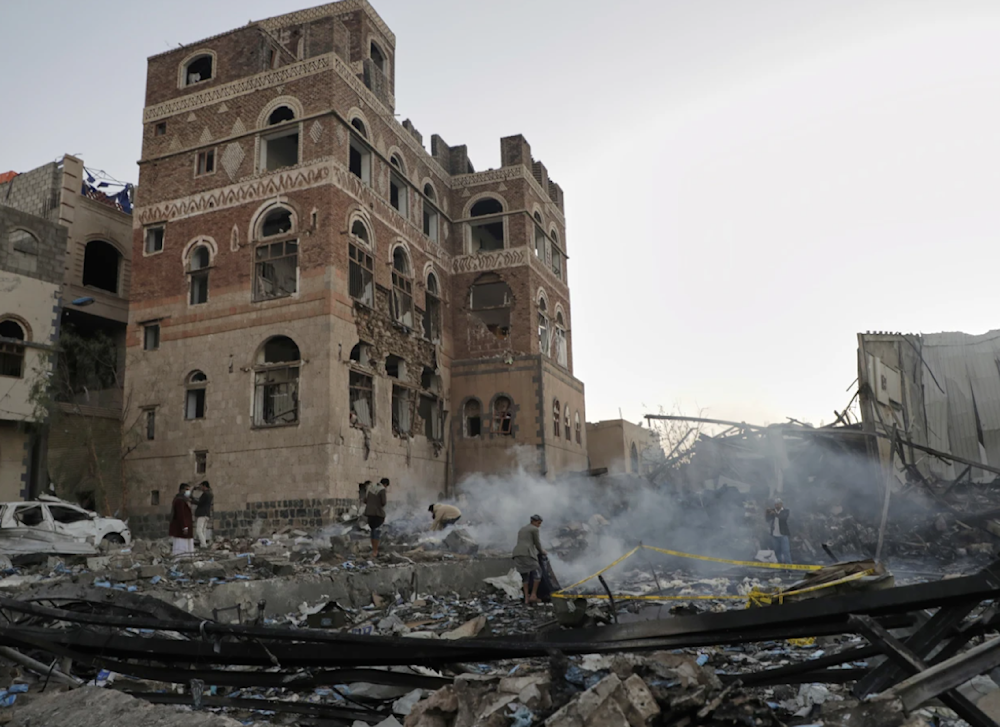Trump’s bombing of Yemen killed as many civilians as 23 years prior
Under Donald Trump, the US bombing campaign in Yemen has killed nearly as many civilians in two months as in the previous 23 years combined.
-

Locals inspect the site struck by US airstrikes overnight in Sanaa on March 20, 2025 (AP)
The US bombing campaign in Yemen under Donald Trump caused nearly as many civilian deaths in just two months as all American strikes on the country over the previous 23 years combined, according to an analysis by monitoring group Airwars.
Their report on Operation Rough Rider found that 224 civilians were killed between March and May, compared to 258 deaths from 2002 to 2024. The spike in casualties from just 33 strikes suggests a major shift in US military policy. This, Airwars warns, could foreshadow what may happen if Trump supports "Israel’s" bombing campaign in Iran.
A warning of what’s to come
“This campaign sets the tone for Trump at war, and for what allies can do. With the US poised for escalation, we have to understand the Yemen campaign to understand what the future holds,” said Emily Tripp, director of Airwars, who emphasized that understanding what happened in Yemen is key to understanding what the future could hold.
Targeting civilians disproportionately to any military gain violates the Geneva Conventions and constitutes a war crime. However, that standard has increasingly been eroded, most notably in the Israeli war on Gaza, where strikes have killed over 100 civilians at a time.
According to The War Lawyers by Craig Jones of Newcastle University, previous US presidents set limits on the number of civilian casualties allowed without requiring special approval. Under Trump, however, those thresholds appear to have been abandoned.
Operation Rough Rider, a US aggression launched in March against the Yemeni Armed Forces(YAF), was intended to halt attacks on merchant shipping in the Red Sea and Gulf of Aden, carried out in support of Gaza and targeting Israeli and Israeli-affiliated vessels, following earlier strikes during the Biden administration. The campaign cost an estimated $1 billion in its first month alone.
Trump mocked Biden's earlier response as “pathetically weak", while internal Signal messages between senior US officials discussing the start of the bombings were accidentally leaked to a journalist.
April 17: The deadliest strike
Airwars identified the two deadliest strikes in April. On April 17, a US bombing of the Ras Isa port near Hodeidah, targeting oil facilities, killed at least 84 civilians, making it the most lethal attack of the campaign.
Airwars compiles its casualty figures by analyzing official reports, media coverage, and death notices posted by relatives on social media platforms like Facebook.
Among the victims were two young boys, Fadel Fawwaz Ali al-Musq and Mohammad Ali Saleh Asaad al-Musq, who were killed after they accompanied a family member working as a driver, according to posts by grieving relatives.
The day after the bombing, the local Red Crescent branch reported that the strikes came in two waves. After the initial bombs were dropped, the aircraft continued circling overhead before launching a second strike, this time hitting after first responders had arrived.
US Central Command later claimed the operation targeted a fuel source for the YAF and that harming civilians was not the intention.
The second-deadliest strike documented by Airwars occurred on April 28, 2025, when US airstrikes hit a remand detention center in Saada, killing 68 civilians and injuring at least 47 more. The facility primarily housed African migrants and was believed to be holding around 115 people at the time. Graphic images and video footage of bodies at the scene were widely broadcast.
Long history of US bombing in Yemen
In early May, US Central Command acknowledged awareness of the reports and stated it was assessing the claims of civilian casualties, but no further updates have been provided.
The US has conducted airstrikes in Yemen since 2002, beginning with a drone attack that killed six al-Qaeda members. Civilian deaths were first officially recorded in 2009, when 49 people were killed in a cruise missile strike targeting an al-Qaeda camp.
Operation Rough Rider concluded in May after the US and the YAF reached a ceasefire, completely sidelining "Israel".
The US reported conducting 1,000 strikes during the campaign. In exchange for an end to the bombing, the YAF agreed to halt attacks on US naval assets, as claimed by Trump.

 4 Min Read
4 Min Read










